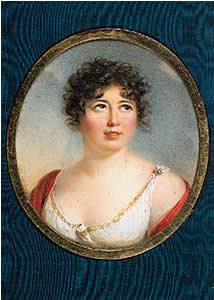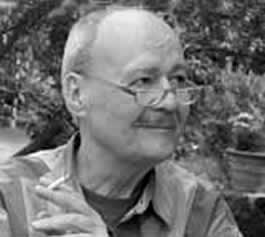|
De Franse schrijfster Madame de Staël werd in Parijs geboren op 22 april 1766. Zie ook alle tags voor Madame de Staël op dit blog.
xml:namespace prefix = o ns = "urn:schemas-microsoft-com:office:office" />
Uit: De l'Allemagne
Il y a dans les poèmes épiques, et dans les tragédies des Anciens, un genre de simplicité qui tient à ce que les hommes étaient identifiés à cette époque avec la nature, et croyaient dépendre du destin comme elle dépend de la nécessité. L'homme, réfléchissant peu, portait toujours l'action de son âme au-dehors; la conscience elle-même était figurée par des objets extérieurs, et les flambeaux des Furies secouaient les remords sur la tête des coupables. L'événement était tout dans l'antiquité, le caractère tient plus de place dans les temps modernes; et cette réflexion inquiète, qui nous dévore souvent comme le vautour de Prométhée, n'eût semblé que de la folie au milieu des rapports clairs et prononcés qui existaient dans l'état civil et social des Anciens.
On ne faisait en Grèce, dans le commencement de l'art, que des statues isolées; les groupes ont été composés plus tard. On pourrait dire de même, avec vérité, que dans tous les arts il n'y avait point de groupes; les objets représentés se succédaient comme dans les bas-reliefs, sans combinaison, sans complication d'aucun genre. L'homme personnifiait la nature; des nymphes habitaient les eaux, des hamadryades les forêts : mais la nature à son tour s'emparait de l'homme, et l'on eût dit qu'il ressemblait au torrent, à la foudre, au volcan, tant il agissait par une impulsion involontaire, et sans que la réflexion pût en rien altérer les motifs ni les suites de ses actions. Les Anciens avaient pour ainsi dire une âme corporelle, dont tous les mouvements étaient forts, directs et conséquents, il n'en est pas de même du cur humain développé par le christianisme : les modernes ont puisé, dans le repentir chrétien, l'habitude de se replier continuellement sur eux-mêmes.

Madame de Staël (22 april 1766 Parijs, 14 juli 1817)
Portret door Louis-Ami Arlaud-Jurine, ca 1805
De Engelse schrijver Henry Fielding werd op 22 april 1707 in Glastonbury geboren. Zie ook alle tags voor Henry Fielding op dit blog.
Uit: Tom Jones
But in process of time, and in ages of ignorance, the clerk began to invade the power and assume the dignity of his master. The laws of writing were no longer founded on the practice of the author, but on the dictates of the critic. The clerk became the legislator, and those very peremptorily gave laws whose business it was, at first, only to transcribe them.
Hence arose an obvious, and perhaps an unavoidable error; for these critics being men of shallow capacities, very easily mistook mere form for substance. They acted as a judge would, who should adhere to the lifeless letter of law, and reject the spirit. Little circumstances, which were perhaps accidental in a great author, were by these critics considered to constitute his chief merit, and transmitted as essentials to be observed by all his successors. To these encroachments, time and ignorance, the two great supporters of imposture, gave authority; and thus many rules for good writing have been established, which have not the least foundation in truth or nature; and which commonly serve for no other purpose than to curb and restrain genius, in the same manner as it would have restrained the dancing-master, had the many excellent treatises on that art laid it down as an essential rule that every man must dance in chains.

Henry Fielding (22 april 1707 - 8 oktober 1754)
Albert Finney als Tom Jones in de film van Tony Richardson uit 1963
De Duitse schrijver en vertaler Michael Schulte werd geboren op 22 april 1941 in München. Zie ook alle tags voor Michael Schulte op dit blog. Zie ook alle tags voor Michael Schulte op dit blog.
Uit: Ich freu mich schon auf die Hölle
Es gab keine Einteilung in Klassen, wie bei Zwergschulen sonst üblich, alle Zöglinge, sie waren zwischen acht und vierzehn Jahre alt, mussten dasselbe didaktische Programm über sich ergehen lassen. Das größte Vergnügen waren Bobbys Erdkundestunden - eigentlich eher Erdkundeminuten. »Anfangen tun wir mit Deutschland«, sagte er und schlug seinen zerfledderten, speckigen Diercke-Atlas von 1898 auf. »Und zwar folgendermaßen: Heute mach ma die Städte, nächste Woch die Flüss und dann die Berg. Also schlagts die Hefte auf und schreibts: München, Stuttgart, Frankfurt, Hannover, Hamburg. Des is von unten nach oben, wohlgemerkt. So, und des lernts auswendig bis nächste Woch.« Der Bobby erhob sich und schlurfte davon. An der Tür blieb er stehen und rief: »Jessas, jetzt hätt i beinah was vergessen. Schlagts die Hefte noch mal auf und schreibts: Berlin.«

Michael Schulte (München, 22 april 1941)
De Cubaanse schrijver Guillermo Cabrera Infante werd geboren op 22 april 1929 in Gibara, Cuba. Zie ook alle tags voor Guillermo Cabrera Infante op dit blog.
Uit: The Art of Fiction No. 75 (Interview door Alfred Mac Adam)
INTERVIEWER
Swift was no less devoted to digression than Sterne. What do you think of him?
CABRERA INFANTE
The digressor as aggressor. The difference is that Swift was all saeva indignatio and that savage indignation was the motor of all his writings. You couldnt find a less playful writer among his contemporaries. Compared to Swift, Pope was a stand-up comedian.
INTERVIEWER
You seem to have an affinity for English eighteenth-century satiresomething people might not expect from a Cuban writer. How do you understand satire, as a literary genre?
CABRERA INFANTE
Look, my friend, who knows what to expect from a Cuban writer, or any writer anywhere? Why not Sterne and Swift? Or Armor and Swift? At best, satire is didactic. At worst, political. This means that satires are not ludic or playful but just the opposite. They are the play wherein the satirist catches the conscience of the audience, which is why they are so closely related to sermons, religious tracts, and political pamphlets. Personally, I feel closer to Swifts motto, Vive la bagatelle, than to his epitaph. Long live trivia! Where he and I part company is the grave, where his satire is most serious, and where I would rather turn that bagatelle into bag-a-Stella. Swift wanted to use satire, literature, to mend the World. To me this makes writing, which should be an end in itselfliteratureinto something political. Any literary work that aspires to the condition of art must forget politics, religion, and, ultimately, morals. Otherwise it will be a pamphlet, a sermon, or a morality play. Even the greatest moralist of our century, Joseph Conrad, was first and foremost an entertainer.

Guillermo Cabrera Infante (22 april 1929 21 februari 2005)
De Duitse schrijver Ludwig Renn (eig. Arnold Friedrich Vieth von Golßenau) werd geboren op 22 april 1889 in Dresden. Zie ook alle tags voor Ludwig Renn op dit blog.
Uit: Nachkrieg
Nach dem Auszug der Siedler wurden die Reste der Kompanien vereinigt, und wir zogen möglichst dicht zusammen, um nicht so sehr zu frieren.
Ich wurde jetzt zur Abwicklung der letzten Geschäfte der Truppe verwendet. Bücher mussten abgeschlossen werden. Eine große Zahl von Gerichtsverfahren liefen noch wegen unberechtigten Verkaufs von Dienstgegenständen oder wegen Diebstahls. Aber die Täter waren nicht mehr da. Und in den Akten musste vermerkt werden, wohin wir die Betreffenden entlassen hatten. Diese Beschäftigung musste bald zu Ende sein. Dann wollte ich mir Arbeit suchen.
Da traf ich gelegentlich auf der Straße den Grassert. Der schlug mir vor, zur Sicherheitspolizei zu gehen, für die eben geworben wurde. Ich lehnte das entschieden ab. Aber als ich mit Falbel darüber sprach, sagte der: Das ist ja ausgezeichnet! Du wirst als ehemaliger Vizefeldwebel gleich Wachtmeister, und wir haben einen Mann drin!"
Ich mag aber diesem verfluchten Staat nicht mehr dienen!" Du willst lieber in die Fabrik gehen und dich vom Kapitalisten ausbeuten lassen?"
Ich überlegte mir's noch einmal. Mit der Arbeit sah es jetzt noch schlechter aus als im Herbst. Und ich meldete mich zur Sicherheitspolizei.
Die Werbestelle der Polizei befand sich in einer Kaserne. Ich wurde mit noch einem nach der Stube 327 geschickt. Wir mussten uns ausziehen. Ein Stabsarzt mit einem merkwürdig bekümmerten Gesichtsausdruck kam herein. Das passte gar nicht zu seiner Uniform und seiner strammen Haltung. Der betrachtete mich. Ja, haben Sie denn gedient?"
Jawohl."

Ludwig Renn (22 april 1889 21 juli 1979)
|



